| Srl | Item |
| 1 |
ID:
089336
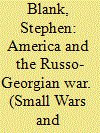

|
|
|
|
|
| Publication |
2009.
|
| Summary/Abstract |
The Russo-Georgian War of 2008 had profoundly negative consequences for European security, which were exacerbated by the inability of the US and Europe, either individually or collectively, to offer any resistance to this aggression. Thus this war and its aftermath showed the effects of incoherent policy-making, enfeebled political will and disunity in the Western alliance. For Washington it also represented a harvest of a misconceived policy towards Georgia that lost control over Georgian policy and may have contributed to Tbilisi's recklessness.
|
|
|
|
|
|
|
|
|
|
|
|
|
|
|
|
| 2 |
ID:
089333
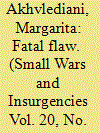

|
|
|
|
|
| Publication |
2009.
|
| Summary/Abstract |
This paper examines the role of the media during and after the August invasion of Georgia by Russian troops. It shows how on both sides the media responded to strong pressures to report the conflict from a very one-sided perspective. Indeed the conflict can be seen as a media as much as a military conflict as both sides struggled to present themselves in the best possible light before the international community and to exaggerate the losses that had been inflicted on their own rather then their enemy's forces. The article details the way this conflict was played out in printed media and TV as well as Internet blogs and provides information on the cyber war, which also broke out between the rival states.
|
|
|
|
|
|
|
|
|
|
|
|
|
|
|
|
| 3 |
ID:
089330
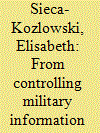

|
|
|
|
|
| Publication |
2009.
|
| Summary/Abstract |
This article demonstrates how the Russian state's reconstruction of the communication network for the armed forces and information services served two purposes: firstly, to silence the free media and exert control of information on a nationwide level, and secondly, to draw upon the armed forces to reinforce its patriotic discourse. The relative liberalization of the media in the early 1990s led to a media defeat of the Russian army during the First Chechen war. Consequently, in the second war, renewed control of the media was progressively established, the goal of which was to deny access to independent journalists, on one hand, and to set up a more efficient communication network, on the other. This restructured network encompassed the internal network of the armed forces but was also destined to serve the outer civilian world - the Rosinformtsentr was created to this end. The implementation of these measures intensified over the summer of 2000, finally culminating in the adoption of the Information Security Doctrine, the revamping of military media and the placement of siloviki members in certain media posts. By putting the army back on center stage and giving it a prominence that it had lacked ever since the end of the USSR, the government attempted to mobilize society around a nationally sanctioned idea. The army, which easily fell into its historically familiar role, which it had actually never fully relinquished, has been able to easily reactivate this military-patriotic tendency in the public and to thus propagate a form of traditional military thinking that tends to be resistant to reform.
|
|
|
|
|
|
|
|
|
|
|
|
|
|
|
|
| 4 |
ID:
089327
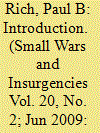

|
|
|
|
|
| Publication |
2009.
|
| Summary/Abstract |
On 8 August 2008 Russian troops invaded Georgia in a short military operation that has led to an effective Russian takeover of the South Ossetia and Abkhazia.The immediate case of the invasion was a dispute over the status of the region of South Ossetia, which up to 1990 had formed an autonomous Georgian Soviet Republic.
|
|
|
|
|
|
|
|
|
|
|
|
|
|
|
|
| 5 |
ID:
089334
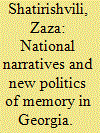

|
|
|
|
|
| Publication |
2009.
|
| Summary/Abstract |
This paper examines three dominant forms of national narratives concerning the fate of the Georgian nation: the old or classical narrative concerning the salvation and rescue of the Georgian nation despite imperial aggression; the narrative of the 'Rose Revolution' telling of the birth of a new nation; and a third narrative of the Georgian Christian Orthodox Church. The first narrative was favored by the old socialist intellectuals and has been eclipsed by the second narrative favored by 'new intellectuals'. Likewise the Orthodox narrative is not anchored on ancient Georgian churches but the new Shrine of the Trinity in Tbilisi. The paper argues that all three narratives embody realms of memory in Georgia and are vital to the understanding of impulses behind Georgian politics. It also suggests that Georgia has not so far undergone a full secularization in the Western sense and has been unable so far to construct new secular realms of memory though the old secular realms associated with the Shevardnadze era have been devalued. The article concludes by briefly discussing the significance of the Georgian intellectual Merab Mamardashvili whose grave in a common cemetery demonstrates the possibility of 'spontaneous' or 'vivid' memory.
|
|
|
|
|
|
|
|
|
|
|
|
|
|
|
|
| 6 |
ID:
089332
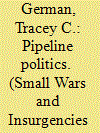

|
|
|
|
|
| Publication |
2009.
|
| Summary/Abstract |
The development of new energy export infrastructure, which bypasses Russia, has constituted a fundamental element of US and European engagement with the Caucasus in recent years, but has, to some extent, undermined Moscow's hegemony in an area that it considers to be its own 'strategic backyard'. This article examines the validity of the argument that Russian military intervention in Georgia in August 2008 was motivated by so-called 'petro-politics' and a desire to punish Tbilisi for its overt pro-Western orientation. It analyses the significance of the pipelines that transit Georgia and their implications for European energy security, together with the potential consequences of the 2008 conflict for future infrastructure developments.
|
|
|
|
|
|
|
|
|
|
|
|
|
|
|
|
| 7 |
ID:
089328
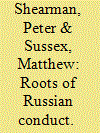

|
|
|
|
|
| Publication |
2009.
|
| Summary/Abstract |
This article examines the reasons behind Russia's decision to go war with Georgia in August 2008. It evaluates the key potential drivers of Russian policy relating to structural, domestic and perceptual factors.
|
|
|
|
|
|
|
|
|
|
|
|
|
|
|
|
| 8 |
ID:
089329
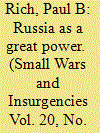

|
|
|
|
|
| Publication |
2009.
|
| Summary/Abstract |
This paper explores historically Russia's status as a great power in first the European and later the global states system. It argues that its role as a 'superpower' was really a temporary aberration during the Cold War period and that since the collapse of the Soviet Union Russian foreign policy has been essentially guided by the desire to reaffirm its great power status and emergence as an energy superpower centred on the export of oil and gas. Western policy towards Russia needs to be guided by a far more sophisticated awareness of this transformation and a greater understanding of the importance of the symbols of power and status that might look rather dated and backward looking in terms of the construction of regional European security and the 'post-national' project of the European Union.
|
|
|
|
|
|
|
|
|
|
|
|
|
|
|
|
| 9 |
ID:
089335
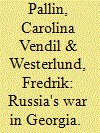

|
|
|
|
|
| Publication |
2009.
|
| Summary/Abstract |
The Russian military operation during the Five-Day war in Georgia points to a number of lessons with strategic implications for Russia. The deficiencies in its military performance - not least concerning C4ISR and precision strike capability - have underscored the need for a modernization of the Armed Forces and a diversification of Russia's military capability. Russia needs to arrive at a strategic decision on the priorities for the future development of its military and defence industry: should it prepare for large-scale wars or post-modern warfare and counter-insurgence? In the meantime, the scope of Russian military strategy will be clearly limited and military force will remain a powerful but blunt security policy instrument.
|
|
|
|
|
|
|
|
|
|
|
|
|
|
|
|
| 10 |
ID:
089331


|
|
|
|
|
| Publication |
2009.
|
| Summary/Abstract |
Russia's intervention in the Georgian-South Ossetian conflict has highlighted the need to rigorously examine trends in the public debate over the use of force in Russia. Approaching this debate through the prism of civil-military relations, we take advantage of recent methodological advances in automated content analysis and generate a new dataset of 8000 public statements made by Russia's political and military leaders during the Putin period. The data show little evidence that military elites exert a restraining influence on Russian foreign and defence policy. Although more hesitant than their political counterparts to embrace an interventionist foreign policy agenda, Russian military elites are considerably more activist in considering the use of force as an instrument of foreign policy.
|
|
|
|
|
|
|
|
|
|
|
|
|
|
|
|